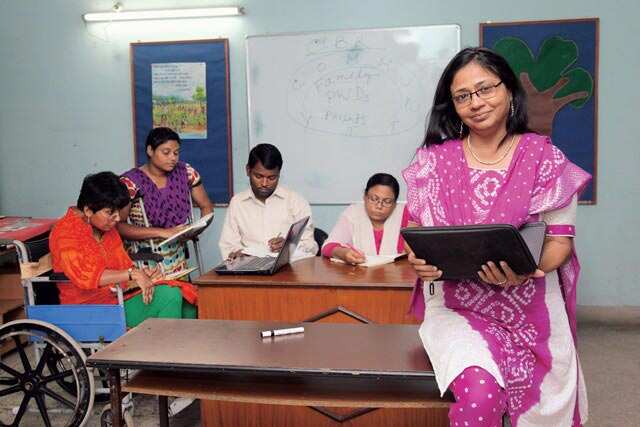What started as a bit of social work on the sidelines of theatre, became a life-changing experience for Tulika Das, a disability rights activist, who has been working tirelessly towards integrating the differently abled into mainstream society.

Regarded as one of India’s foremost disability rights activists, Tulika Das admits she never really planned to become a social entrepreneur. Clad in a simple pink and white cotton salwar kameez, Tulika seems to have an aura of calmness about her as she settles in to speak with Femina about her life, work and what ails the disability rights movement in India.
Tulika’s unassuming disposition makes you wonder how she manages to have her way around the authorities while vouching for equal rights for the differently abled. “Authorities should do away with a charity-based approach to solving their problems,” says Tulika.
Theatre has played a vital role in shaping her personality. The usually-taciturn woman takes on a fiery attitude as she steps on the stage and that makes you believe, that when she is passionate about something, there is nothing that can stop her.
“I owe my love for theatre to my father. He was the quintessential Bengali intellectual. I acted in plays under my father’s guidance when I was a teenager. Theatre, or any art for that matter, helps you grow as a person.”
The accidental beginning
Upon a friend’s insistence, she decided to do a play on the issue of disability. “It was a play staged by students at Rabindra Bharati University in Kolkata where I studied theatre,” recalls Tulika. “It revolved around a woman in a wheelchair who wanted to have a child and her sister offered to be a surrogate mother.”
Theatre took a backseat after her father passed away. Tulika was still in her early 20s and took some time to reconcile with her loss. It was during this period that a close friend introduced her to Sanchar, a non-profit organisation, which was then manned by a handful of activists covering about 20 villages in West Bengal.
Extensive field work was a part and parcel of my training when I embarked on this journey in 198990. At that time, I went to a village called Rasapunja and what I saw there brought a sea change in my perspective on life.” Tulika was assigned the task of rehabilitating a family of five in the village. “Of four siblings, two were deaf, one was dying of thalassaemia and the eldest daughter was shouldering all their responsibilities,” she recalls. “Their father was a purohit (priest) trying hard to make ends meet. They lived in a dilapidated hut and you had to crouch to go inside. When I met this family, I realised how privileged I was.” And that is how the seeds of a lifetime’s commitment to the cause were sown.
With her work spanning more than two decades, Tulika is considered a pioneer in community-based rehabilitation (CBR) for the disabled. She heads the CBR India Network and works passionately towards promoting the rights of every person with disability. She remembers one interaction in Kolkata that was particularly illuminating for her. “During those initial years as a disability rights activist, I attended a parents’ meet in Kolkata. At that meeting, a young mother was describing how her five-year-old mentally challenged son was unwittingly torturing her just-born baby. He thought his sister was a toy. And the young woman was clueless about how to handle the situation.” Tulika realised then that family members of people withdisabilities also needed support to cope with the responsibilities. Today, her team travels to remote corners of West Bengal to ensure that this support is provided to such families.
Leading the way
Tulika is striving towards a national movement for a new Rights of Persons with Disabilities (RPD) legislation. This would replace the outmoded Persons with Disabilities Act of 1995 and put in place a charter of rights inaccordance with the mandate of the United Nations Convention on Rights of Persons with Disabilities (CRPD) to which India is a signatory.
Tulika points out that the 1995 Act doesn’t quite address the civil-political, health and education rights of the differently abled. “It is as if the differently abled cannot make decisions on their own and have to depend on their legal guardians,” stresses Tulika.
Tulika, who became an Ashoka Fellow (a global recognition for social entrepreneurs) in 2004, has led Sanchar towards a path of exponential growth. It now covers 110 villages of 16 gram panchayats in West Bengal. “When we started out, there were very few organisations in India offering CBR,” says Tulika. Today, Sanchar trains almost 50 per cent of around
500 CBR organisations working in 17 states across India. “We are also part of women’s rights and child rights networks and we are a unified front fi ghting for inclusion of persons with disabilities in mainstream society,” she says. At the moment, Tulika is also playing a German teacher Rajar Khonje, a play that draws parallels between the demolition of a Polish orphanage for Jewish children by Nazi forces in 1942 and the massacre of children in Gaza by Israel in this century. “The play lays bare our hope for that elusive king who will be just and fair,” she says. But off stage, Tulika is waiting for no ruler—she’s making change happen the hard way.